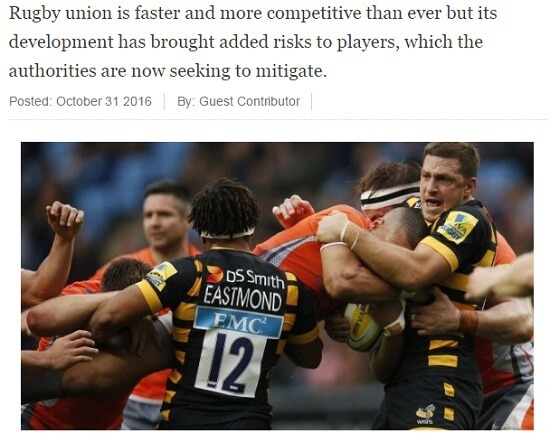Rugby and Head Injuries: Malcolm Underhill Comments in Sports Pro Media
Rugby and Head Injuries: Malcolm Underhill Comments in Sports Pro Media

Injury to bones, tendons and ligaments is common place in a contact sport such as rugby, however injury to the brain has previously been overlooked.
Rugby players may sustain hundreds of cranial impacts (both concussive and subconcussive), leading to delayed-onset dementia pugilistica (“punch-drunk” syndrome), a form of mental deterioration similar to Alzheimer’s Disease.
Repeated concussions have also been shown to cause Chronic Traumatic Encephalopathy, a degenerative disease which leads to dementia. As the dangers presented by concussion become better understood, professional rugby is working to improve player safety.
Protective measures and fast medical intervention
Medical experts advocate swift intervention and early diagnosis when dealing with a suspected brain injury.
Because of the need to quickly and reliably identify concussions, the Rugby Football Union (RFU) has worked hard to improve its method of identifying brain trauma on the pitch by introducing new pitchside procedures.
Contact rugby and childrens’ head injuries
Contact rugby has been part of the UK school curriculum for many years and plays an important role in introducing children to team-based sports.
There is substantial evidence that repeated impacts from contact sports can cause life-altering traumatic brain injuries (TBIs), and the opinion of the signatories is that children and teenagers should not be obliged to play a sport which could potentially result in permanent brain damage.
Studies have shown that childhood TBIs have severe consequences for later life, and that rugby is the leading cause of sports-related brain injuries in children. Young players have also been shown to suffer severe consequences from repeated concussions, with Second Impact Syndrome (a severe, often fatal reaction to repeated concussion) affecting young players almost exclusively.
Contact our brain injury claims experts today
To read the full article please click here or the link below.
